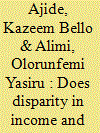|
|
|
Sort Order |
|
|
|
Items / Page
|
|
|
|
|
|
|
| Srl | Item |
| 1 |
ID:
182528


|
|
|
|
|
| Summary/Abstract |
Does disparity in income and consumption incite terrorism in Africa? To answer this important question, we investigate the empirical linkages between inequality and terrorism by separately regressing income and consumption inequalities on four indicators of terrorism: domestic, transnational, unclear, and total over the period 1980–2012. Employing a negative binomial regression across a panel dataset covering 46 African economies, the following findings are established. First, both income and consumption inequalities have decreasing impacts on all terrorism measures—with the exception of uncertain terrorism (the impact of which is negligible). Second, both income and consumption inequalities exert more statistical influence on transnational terrorism than domestic terrorism. Third, income inequality exerts more statistical weight on terrorism measures than consumption inequality across the model specifications. Last, the non-trivial impact of confounding variables—such as the lagged value of terrorism, surface areas, and conflicts—are validated across the terrorism models. In line with these empirical outcomes, policy implications and suggestions for further studies are offered.
|
|
|
|
|
|
|
|
|
|
|
|
|
|
|
|
| 2 |
ID:
186524


|
|
|
|
|
| Summary/Abstract |
This study examines the impact of natural resource rents on terrorism via inequality channel in 34 African economies, straddling the period 1980–2012. This study employs a negative binomial regression, in which the following findings are established: first, the unconditional impact of natural resource rents on terrorism is found to be positive across the model specifications, particularly when Gini and Theil indices are controlled for. Second, inequality has no discernable first-order impact on terrorism across the board. Third, the marginal impacts of interactions between inequality measures, specifically Gini and Theil coefficients and total natural resource rents on terrorism are significantly negative. Four, the corresponding net effects of interactions between natural resource rents and inequality (Gini and Theil coefficients) on terrorism are positive, thus lending support to earlier submission of involving all constitutive variables in the specifications for the parameters to make economic sense. The results are robust to accounting for fixed and country effects using the Poisson Pseudo maximum likelihood high-dimension fixed effects estimator. On the policy front, maintaining fairness and equity in the distribution of rents from the ‘free gifts of nature’ remains a veritable policy menu, especially for the resource-rich economies, to counteracting terrorist activities.
|
|
|
|
|
|
|
|
|
|
|
|
|
|
|
|
|
|
|
|
|